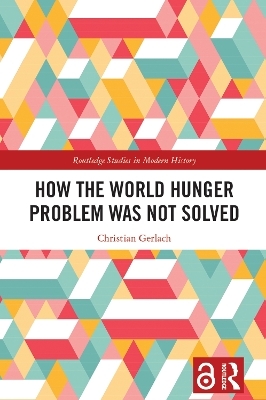
How the World Hunger Problem Was not Solved
Routledge (Verlag)
978-1-032-58492-8 (ISBN)
Together with an in-depth account of the world food crisis, this book analyses how this global scheme largely failed. It shows its diverse initiators, their reasoning and motives, its political breakthrough, the degrees to which it was implemented globally and nationally in the following decades and its socioeconomic effects in rural areas. Despite internationally coordinated policies and coercive means, the scheme failed on all levels: situation analysis, design, policies, incapable institutions (including big business), implementation and peasants’ responses. Selective realization in certain regions and for certain crops and the appropriation of funds by local elites often aggravated inequality and hunger. Case studies are about Bangladesh, Indonesia, Tanzania and Mali. The book shows limits to global social engineering, imperialism and state control.
It is aimed at students, scholars, activists and non-specialists interested in development and the world food problem.
The Open Access version of this book, available at http://www.taylorfrancis.com, has been made available under a Creative Commons Attribution-Non Commercial-No Derivatives (CC-BY-NC-ND) 4.0 license.
Christian Gerlach is Professor of History at the University of Bern. His fields of research are mass violence, war and the history of agriculture, food, hunger and development. Among his earlier books is Extremely Violent Societies: Mass Violence in the Twentieth Century World (2010).
1. Introduction: the Global Level 2. The World Food Crisis, 1972-75 3. A Global Wave of Famines 4. The Small Peasant approach to Combatting Hunger and Poverty; Ideas and Breakthrough 5. Degrees of Implementation: Global Perspectives 6. Unexpected Limits of Growth: The Spread of Capital and Technology 7. Bangladesh: Impoverishment, Hunger and Credit 8. Indonesia: Limits to Farming Intensification and Poverty Alleviation 9. Tanzania: Impoverishment after Enforced Villagization 10. Mali: Changes in the Neglected Drylands 11. Comparing the Case Studies 12. Projections and Predictions: Imagining the Future 13. An “Effective Utilization of Women” 14. The Bigger Picture
| Erscheinungsdatum | 16.02.2024 |
|---|---|
| Reihe/Serie | Routledge Studies in Modern History |
| Zusatzinfo | 13 Tables, black and white |
| Verlagsort | London |
| Sprache | englisch |
| Maße | 156 x 234 mm |
| Gewicht | 1320 g |
| Themenwelt | Geisteswissenschaften ► Geschichte ► Regional- / Ländergeschichte |
| Naturwissenschaften ► Geowissenschaften ► Geografie / Kartografie | |
| Sozialwissenschaften ► Soziologie ► Spezielle Soziologien | |
| Weitere Fachgebiete ► Land- / Forstwirtschaft / Fischerei | |
| ISBN-10 | 1-032-58492-0 / 1032584920 |
| ISBN-13 | 978-1-032-58492-8 / 9781032584928 |
| Zustand | Neuware |
| Haben Sie eine Frage zum Produkt? |
aus dem Bereich


